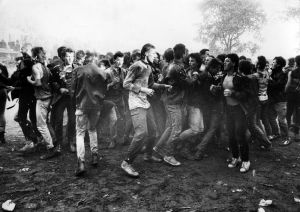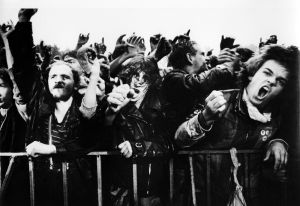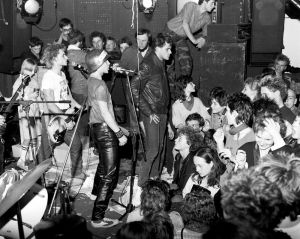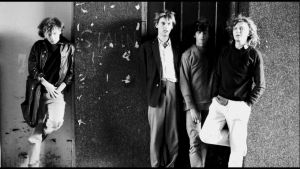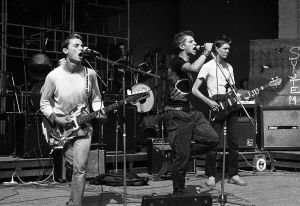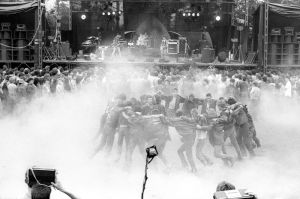Razor Blades & Safety Pins: The Beginnings of Polish Punk
From Unearthing The Music
Text by Patryk Zakrzewski. Originally published in Feb 24 2020 at culture.pl.
Contents
Razor Blades & Safety Pins: The Beginnings of Polish Punk
Their crude style seems to be a form of negating the existing world, including its cultural legacy. We leave this topic in the hands of sociologists, who should seek out the reasons behind our youth’s total frustration’ – someone mused on television in 1980 about this band. Rebellious music found a strong foothold in Poland under the communist regime, and its beginnings included big-city art galleries as much as small-town cultural centres.
As legend has it, at the beginning, there was Walek Dzedzej (born Lesław Danicki). In truth, he sounded more like the Varsovian version of Bob Dylan, but his short-lived band referred to itself as a ‘punk band’. And their lyrics definitely came from a punk viewpoint, contesting both their daily reality and the opposition. In the song Nie Jestem Czym Tym Ty (I’m Not What You Are), he sang:
I’m not small,
I’m not smart,
I’m not stupid,
I’m not in ZMS [a socialist youth group],
I’m not in KOR [the civil society group supporting protesters],
I’m not in the party,
I’m not f*cking nothing.
- Trans. AZ
Dzedzej performed with Złoty Cielec (Golden Calf) and Światowy Ząb (World Tooth), two other ephemeral bands founded by the proto-punk Andrzej Zuzak. He played underground events and squatted with his post-hippy group in buildings marked for demolition. He played two concerts with his punk project at Klub Hybrydy, one of Poland’s oldest student clubs, and then moved to East Berlin in the spring of 1978, before punk had properly started in Poland.
Punk in the dark
At the beginning, there were also newspaper clippings. The famed Polish songwriter Lech Janerka wrote his first song, Klaus Mitffoch’s Muł Pancerny, while he was still in the army, after reading an article about the Sex Pistols. He’d never heard of the band, but he tried to imagine what their aggressive and noisy music would sound like. Robert Brylewski first read about punk rock in Życie Warszawy (Warsaw Life) newspaper:
The movement started in Poland a little blind. I remember I found an article in ‘Warsaw Life’. At the time, they were writing dreadful lies about punk rock in the West. A few truths were tangled up in there too, which interested me.
They wrote that punk songs are very short, rhythmic, with aggressive lyrics. I liked that. I really wanted to play music, but I was turned off by bands like Yes, full of blokes wearing flowing, sequined shirts, standing there in beams of light and singing about purple radiators in crimson skies. So I really wanted to discover this new music, which was simple, without overwrought metaphors. I was in my second year of high school and finally stumbled upon some CDs. One day, a friend and I dressed up so that there would be no doubt that we were punks. We put on old suit jackets, to which we’d stuck a bunch of safety pins and razor blades. We painted our eyes black up to our eyebrows, and we boldly stood under the Rotunda, waiting to make contact with someone. In a bit, a bloke in a leather jacket buttoned up to his chin started hanging around us. ‘That’s got to be a cop’, I thought. Suddenly he comes up, unbuttons his lame coat, and under that, he has a thin tie covered in safety pins. ‘Gentlemen, me too,’ he said. ‘Let’s meet at Club Bolek’. That’s how it started. There was no punk uniform à la ‘Ramones and a mohawk’ yet, just total freedom.
- Trans. AZ
‘Code Name: Razor Blade’
There were also albums sent by relatives from England, or bought from sailors in port cities, or even songs from Radio Luxembourg and Free Europe. One time, a group of teens from Ustrzyki Dolne (who would later come together as the punk band KSU) was listening to these foreign radio stations, waiting for their favourite songs from Black Sabbath or Led Zeppelin. Instead, the station played The Stranglers. ‘They went wild – they didn’t take a step away from the receiver, in case they played something similar,’ reminisced Eugeniusz ‘Siczka’ Olejarczyk.
They wrote a letter to Radio Free Europe. One of the teenagers’ aunts took the letter to Canada and posted it to Munich.
We wrote that in Poland the radios wouldn’t play any punk rock […]. We asked the esteemed radio station to please put on something special for its listeners in the Bieszczady region. We signed off with made up pseudonyms, all feminine just in case, though even now I’m not sure what that naïve camouflage was for. Who else, if not us, would have written to RFE asking for punk music?
Bohdan ‘Bohun’ Augustyn, then-leader of KSU, trans. AZ
They were already known in the area. They’d seen British punks in a newspaper that one of their fathers had picked up during a work trip. ‘How cool, we thought, and soon, we looked similar’. They were also fascinated by the style (but not the ideology) of Italian street fights from the film San Babila-8 P.M. That connection led to the band’s aggressive look – leather, chains, mail carrier and train conductors’ hats. By contrast, the preferred look in Warsaw was diverse and extravagant: ‘We bought pre-war shiny suits, walked around in orange workers’ vests, dyed our hair different colours’ – said Tomasz Lipiński in an interview with Mikołaj Lizut.
Not much later, a radio programme dedicated to the listeners from Bieszczady came on – a whole hour of punk. The programme delighted the youth and startled the secret police in Krosno County. Officials were worried for another reason as well – next to graffiti spelling out PUNK, the mysterious acronym WRB started showing up around town, often accompanied by a drawing of a Ukrainian coat of arms. These signs were a sign of patriotism in Ustrzyki – WRB stood for ‘Wolna Republika Bieszczadzka’ (the Free Republic of Bieszczady). Officials believed that the slogan was secretly about anti-Soviet and anti-state sympathies. They were also uncertain what KSU stood for. Supposedly, the name came from the string of letters on local vehicle registration plates, but some claimed it stood for Komitet Samoistnej Ukrainy (the Committee of Independent Ukraine). An investigation into the matter was launched, under the codename ‘Żyletka’ (Razor Blade).
‘Tilting reality’
For the crew in Warsaw, the British band The Raincoats’ concert at club Remont on 1st April 1978 was a breakthrough moment. The concert took place as part of the first international festival in Central and Eastern Europe, all under the theme I Am – International Artists Meeting, organised by Henryk Gajewski. Robert Brylewski described the festival in his book Kryzys w Babilonie (Crisis in Babylon):
The Raincoats made a huge impression. [...] Back then, we didn’t have a band, but it was certain that we had to form one. The Raincoats’ performance solidified that idea for us.
- Trans. AZ
A year later, Brylewski’s band The Boors debuted at the House of Culture in Anin, a district on the outskirts of Warsaw. The event poster also promised a performance from Manchester’s The Lions. In reality, it was a cover band made up of locals (including the famous Kazik Staszewski). Despite that, part of the audience supposedly bought into it.
The Boors made an impression with their song I’m Not a Communist. In 1979, this kind of public declaration was something. Soon, the band underwent a shakeup, and Maciej Góralski, a Polish Studies major, joined the line-up. He had access to the newest English albums. Other than Jamaican and post-punk inspirations, he added intriguing lyrics to the band – Polish lyrics, so the band changed to a Polish name, Kryzys. Under the decadent policies of Edward Gierek, the word ‘kryzys’ (crisis) featured in the papers more prominently than ever before. The band sang about the youth’s problems, the issues that cultural institutes like Estrada didn’t know about. The words might have been naïve, but they weren’t without literary references.
‘Next to lyrics about school, girls and boredom, there were also allusions to Oscar Wilde, Franz Kafka, William Golding and the Bible,’ Rafał Księżyk wrote about the band.
‘The music was more important than the ideology. Besides, the ideology wasn’t well defined, causing a split between mockery and provocation. The beginnings of punk rock were so diverse that people would often say completely opposing things. And that was great. It created a democratic agora,’ said Robert Brylewski. In that same year, Fornit was formed. The band’s leader, Paweł ‘Kelner’ Rozwadowski, later known from the bands Deuter and Izrael, was a high school student at the time and spoke of his first exposure to music: ‘Three chords and an explosion. A full explosion, full expression. Complete wreckage.’
Another popular band in Warsaw was Tilt. The band members were a few years older than the high-schoolers in Kryzys and Fornit, and they had actual ties to the artistic world (the band’s manager, Piotr Rypson, was the vice-director of the National Museum in Warsaw in 2018). Member Jacek ‘Luter’ Lenartowicz wrote Dada-influenced lyrics in English, and the band stood out for its artistic visuals during concerts. They played one of their first concerts at Józef Szajny’s Studio Theatre, where the disgruntled or perhaps terrified audience disconnected the power. Lipiński explained the decision behind the name to Gazeta Wyborcza:
‘Flippers’ were very popular in those days – these arcade games. Out of boredom, the youth would spend hours in front of them. When you yanked at the flipper too hard, a sign saying ‘tilt’ would appear, and everything would stop working. You lost all your points. That’s what we wanted to do to society – ‘tilt’ it.
- Trans. AZ
Henryk Gajewski described their first concert in the zine Punk:
After the first […] Tilt concert […] I spoke to my friend who was a musician. ‘So? Do the guys have energy?!,’ I asked, and he answered: ‘Yeah, but they have to learn how to play first’. Unfortunately, he doesn’t understand that it’s harder to play poorly. To play well, all you have to do is learn the technique, scales, fingering – the rules are set. To play badly, you can’t follow any rules. You have to create them on the spot. You have to tell the public, like Luter [percussionist and lyricist of Tilt]: ‘go home and listen to your albums’. The musicians in Tilt […] play badly, but how well!
- Trans. AZ
The punk lifestyle was propagated in alternative zines. These articles helped unite the disparate movements and fulfilled many different functions. Some functioned as sources of information, writing about new developments in the scene and local gossip. Henryk Gajewski’s Post brought together alternative music and the art world. Punks were compared to Dadaists and Futurists and, next to recaps of concerts, there were pieces about Andy Warhol, video art and mail art. Lenartowicz’s Papier Białych Wulkanów (White Volcano Papers) included poetry, experimental writing and collage. It’s also worth mentioning Szmata (Rag), Zjadacz Radia (Radio Eater) created by Deadlock, as well as Turysta (Tourist) and Dezerter’s Azotox.
Coming in from the sea
Another culturally important place was the Tri-City of Gdańsk, Gdynia and Sopot. Coming in first was the Gdańsk band Deadlock. The vocalist and musician Kazik Staszewski recalled in an interview:
Deadlock was an unforgettable concert experience. They were a band capable of producing a spectacle out of a concert in a club. Even though they could hardly produce any sound from their instruments.
- Trans. AZ
The band started out playing classic punk, with stronger and stronger reggae influences over time. The Tri-City music scene integrated itself well into Warsaw – some of the musicians from Deadlock ended up in Kryzys and Tilt, and vice versa.
Other pioneering bands from the Tri-City included Gary Hell, PKS (standing from Punkrockowy Klub Sportowy, or Punk Rock Sports Club), Speedboats and Ściek (Sewage). From the nearby Władysławowo came Nocne Szczury (Night Rats), the first punk band to perform in front of a couple thousand people at the famous Jarocin Festival. ‘To get in, you sent out a tape. They accepted us. I think it was on the same principle as discovering a new form of bacteria. As an oddity, a curiosity’, explained band leader Zbigniew Konkol.
On 8th August 1980 in Kołobrzeg, in the same amphitheatre that hosts the Festiwal Piosenki Żołnierskiej (Festival of Soldier’s Songs), the first Polish new wave festival took place, organised by Andrzej ‘Amok’ Turczynowicz from Kanał. Recordings from the festival came out on a cassette titled First Polish New Wave. It was the first exemplar of punk samizdat – illegally distributed media. On one side of the cassette were recordings of Tilt, from other concerts and Kołobrzeg, and on the other side were mostly performances by KSU and one song each from Kryzys, Fornit, Kanał as well as Poerocks from Wrocław. From the beginning of the 1980s, more bands from Wrocław joined the frontlines of the punk revolution – Zwłoki (Corpses), Sheck ’80 and Sedes (Toilet Seat), the new wave Klaus Mitffoch and the reggae-inspired Miki Mousoleum.
KSU turned out to be the festival’s biggest hit. Mirek Szatkowski from Deadlock claimed:
They outpaced everyone. […] It was just a wave of strength and awe from Bieszczady. […] There was a certain element of rivalry. We were certain that the final bracket would be between us and Tilt, maybe Kryzys […] and here KSU knocked everyone else out. […] They looked amazing, like blokes from London.
- Trans. AZ
At that time, KSU was mostly performing covers with Polish lyrics. The Sex Pistols’ Submission became Ustrzyki, and the Dead Kennedys’ California Uber Alles turned into Miasto Nocą. Instead of the Sex Pistols’ Rock’n’Roll Swindle, they sang about the singer Czesław Niemen (though not at the Kołobrzeg concert). They must have run out of time to write words for the Modern Lovers’ Roadrunner, because for the whole song, they sang ‘roadrunner, roadrunner, one two, three, four’. Tilt proposed putting out a split album between the two bands, but KSU’s leader, Bohun, was going to college after his vacation, so the band returned to the Bieszczady. The debut album finally came out in 1988, with only one original band member remaining.
It’s not easy to give up on a career, school, the possibility of becoming an auto technician, or going to college – for rock and roll. It wasn’t the same as in the West […] For us, there was a constant unknown, walking into an abyss.
- Mirek Szatkowski, trans. AZ
For many others, Gary Hall’s concert was another big event. He supposedly played in the style of The Stooges, but there are almost no recordings left of the concert. As Jacek ‘Ponton’ Jankowski from Kormorany astutely observed, ‘There wasn’t always an imperative to document everything’.
‘The revolution’s best perfumes’
Both Kryzys and Deadlock left behind LPs, but they were both released in unhappy circumstances for the bands. At some point, a French artist named Marc Boulet with some ties to the punk scene showed up in Warsaw. First, he recorded a Kryzys rehearsal and released it without the band’s approval, and then he convinced Deadlock to record at a time when the band barely existed, because half the members had emigrated. Both vinyls were released under the title Solidarité Avec le Rock Polonais (Solidarity with Polish Rock); after all, hardly a week passed before another news story cropped up about the situation in Poland and ‘Solidarity’.
The recordings were promoted as exotic curios from behind the Iron Curtain: a 7” single titled Best Perfumes of the Revolution was released, featuring Kryzys and Deadlock on one side, with the Chinese band Dragons (though knowing Boulet, they might not have actually existed) performing the Sex Pistols’ Anarchy in the U.K. with traditional instruments on the other. The magic of foreign press worked for both bands, and they became famous across Poland – there was even a televised interview of Kryzys.
Robert Brylewski’s band had a wider circulation than most punk bands, most of whom toured outside of the official circuits. Due to this, Brylewski’s band played at larger events with groups like Kombi, Turbo or Izabela Trojanowska. On the cassette 78-81 (on the recording from the concert ‘Rock Opole’), Brylewski tells the public: ‘I’m an international destroyer of rock. We’re destroying it. Rock is dying. Rock is dead. We don’t play rock’. Tilt, on the other hand, turned down any tour schedules that could be tied to Polish show business.
Toruń also became a stop for new-wave bands. After its first year in Kołobrzeg, the punk festival moved to the city of gingerbread and Copernius thanks to the work of Waldemar Rudziecki, who helped revitalise the local scene. Brak (Lack), from Łódż, played, as did Opozycja (Opposition) from Częstochowa (who would go on to become T.Love Alternative), Nocne Szczury (Night Rats), Oddech Szczura (Rat’s Breath), Atak Serca (Heart Attack) and Afront. Local representation came from the band Republika, before their commercial success, as well as Rejestracja (Registration), known from their underground hits Kontrola (Control) and Wariat (Lunatic):
The lunatic walks a street of pointed fingers
People laugh at who knows what
His pants are weird, his hair is weird
The grey robots have a laugh at that… - Trans. AZ
The punk disease spread to the rest of Poland, a process that accelerated under Martial Law. The new bands became more politically active. At the Polish Worker Party’s Manufacturing Academies in Warsaw, there was the band SS-20, later forced to change its name to Dezerter. The original name came from Soviet ballistic missiles with nuclear warheads that were aimed at foreign capitols (although this was obviously done in secret).
Many musicians from the first wave of punk emigrated West, leaving behind wrecked bands. From the wreckage of Tilt and Kryzys comes Brygada Kryzys, whose legendary debut in 1982 becomes the first officially released punk album in Poland. Meanwhile, at the Jarocin Festival, a new wave of bands approaches: the excellent Kontrola W (from Zduńska Wola); the ska-influenced Corpus X (from Szczecin); WC, short for Wyidealizowana Ciemność (Idealised Darkness) from Miastko; as well as Toruń’s pop-punk Bikini and the aforementioned SS-20.
During Martial Law, the first punk concert tour took place: Rock Galicja ’82. It was made up of three touring bands: Deuter, Dezerter and TZN Xenna traveling through the towns of Podkarpacie: Rzeszów, Krosno, Jasło, Sanok. Next, there are thousands of people in the military’s Walter Hall, amongst them soldiers from a nearby troop – ‘Kelner’ from Deuter hands them anti-military pamphlets. On top of that, they screened visuals created by Robert Brylewski. Kelner said:
Robert’s ideas were simple but genius, made up of fast, wild edits. For example, he recorded a television set playing Jaruzelski’s visit to farmers whilst placing a razor to the screen. The end result was a clip of Jaruzelski running around the fields with a razor.
- Trans. AZ
Robert Brylewski, in an interview with Rafał Księżyk, said:
I sometimes worry when people try to show us as downtrodden, censured. That’s far from the reality. We were active at a time when the party and the special forces were in such disarray that they couldn’t handle us. […] The tales of musical martyrdom from that time anger me. Even during martial law, despite the trauma, we had a wonderful time and adventure.
- Trans. AZ
Originally written in Polish, Dec 2017; transated by Alicja Zapalska, Dec 2019; edited by NR & LD, Jan-Feb 2020
Sources: ‘Mój Punk Rock Song” by Paweł Konjo Konnak (Warsaw, 2012), ‘Punk Rock Later’ by Mikołaj Lizut (Warsaw, 2003), “Obok albo Ile Procent Babilonu’ (Katowice, 2010), KSU: ‘Rejestracja Buntu’ by Krzysztof Potaczała (Czerwonak, 2015).
